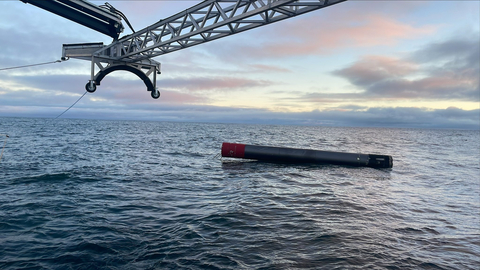Rocket Lab Returns Previously Flown Electron to Production Line in Preparation for First Reflight
- None.
- None.
Insights
The integration of a previously recovered rocket component into the standard production line is a noteworthy step in the aerospace industry, particularly for small orbital launch vehicles like Electron. The ability to reuse the first stage tank is indicative of Rocket Lab's progress in creating a sustainable and cost-effective launch model. The extensive testing regime, including tank pressurization, helium leak checks and carbon fiber structural testing, is critical to ensure the integrity of the reused component. The success in reusing the first stage can potentially reduce the cost per launch, a key factor in the competitive small satellite launch market.
The announcement by Rocket Lab to reintroduce a previously flown first stage tank into their production line for reflight has direct financial implications. The reusability aspect is poised to drive down costs and enhance the frequency of launches, which can lead to increased revenue streams from clients looking for cost-effective space access. Investors should monitor the outcomes of the final acceptance and qualification testing closely, as a successful reflight of the recovered stage could signal improved profit margins and operational efficiency, making Rocket Lab a potentially more attractive investment in the commercial spaceflight sector.
From a supply chain perspective, the reintegration of a flown component represents a shift towards a circular economy within the aerospace sector. This strategy could lead to a reduction in the production lead times and raw material usage, mitigating supply chain risks associated with manufacturing new components. However, the challenge lies in establishing a consistent and reliable process for recovery, refurbishment and reintegration of these components at scale. Success in these areas could serve as a benchmark for sustainability and efficiency in aerospace manufacturing practices.
The carbon composite first stage tank from the Electron rocket, successfully launched and recovered in January this year, has entered back into the standard Electron production line to undergo final acceptance testing and qualification ahead of reflight.

An Electron rocket that delivered satellites into orbit in January 2024 for Spire and
Rocket Lab has successfully recovered multiple Electron first stages from previous missions by returning them to Earth under a parachute after launch, splashing them down in the ocean, then collecting them onto a specially modified boat for transfer back to Rocket Lab’s production complex. All previously recovered boosters have undergone extensive analysis to inform an iterative development process to make Electron reusable, but this is the first time a tank has been moved back onto the standard production line in preparation for reflight.
The stage was successfully launched and recovered as part of the ‘Four of a Kind’ mission on 31 January 2024 and has already passed more acceptance tests than any other recovered Electron stage, including:
- Tank pressurization test – a process that filled the carbon composite tank with inert gas and held it in excess of maximum operating pressure for more than 20x longer than the standard Electron flight duration;
- Helium leak check – a stringent process that determines there are no leaks in the tank; and
- Carbon fiber structural testing – including ultrasonic assessment and other non-destructive tests to confirm no delamination of the carbon composite tank fibers.
The stage will now undergo final fit out and rigorous qualification and acceptance testing to the same standard as a brand-new Electron tank to determine the recovered stage’s suitability for reflight.
“Through an iterative development process, we have methodically perfected each step of Electron recovery while simultaneously continuing to increase our Electron production capacity and launch cadence. This is the exciting final piece of the puzzle before Electron goes reusable,” said Rocket Lab founder and CEO Peter Beck. “Our key priority in pushing this stage back into the standard production flow for the first time is to ensure our systems and qualification processes are fit for accepting pre-flown boosters at scale. If this stage successfully passes and is accepted for flight, we’ll consider opportunities for reflying it in the new year.”
Rocket Lab has carried out iterative modifications across multiple recovery missions to hone the recovery process ahead of first reflight, including:
- Ensuring Electron’s carbon composite structure survives the intense heat and forces of atmospheric reentry through innovative coatings, heat shields, and advanced reaction control systems to control the angle of reentry;
- Refining the parachute system to ensure reliable deployment and smooth deceleration from more than 2,300 meters per second to 10 meters per second;
- Honing the telemetry and tracking systems so the marine recovery team can locate the stage as soon as it splashes down;
- Streamlining the process of collecting the stage from the water in less than an hour, then ensuring safe transit back to the Rocket Lab production complex; and
- Successful launch of a previously flown Rutherford engine.
The payload scheduled to launch on the recovered stage will be announced following the completion of final acceptance and qualification testing.
+ About Rocket Lab
Founded in 2006, Rocket Lab is an end-to-end space company with an established track record of mission success. We deliver reliable launch services, satellite manufacture, spacecraft components, and on-orbit management solutions that make it faster, easier, and more affordable to access space. Headquartered in
+ Forward Looking Statements
This press release contains forward-looking statements within the meaning of the Private Securities Litigation Reform Act of 1995. We intend such forward-looking statements to be covered by the safe harbor provisions for forward looking statements contained in Section 27A of the Securities Act of 1933, as amended (the “Securities Act”) and Section 21E of the Securities Exchange Act of 1934, as amended (the “Exchange Act”). All statements contained in this press release other than statements of historical fact, including, without limitation, statements regarding our launch and space systems operations, launch schedule and window, safe and repeatable access to space, Neutron development, operational expansion and business strategy are forward-looking statements. The words “believe,” “may,” “will,” “estimate,” “potential,” “continue,” “anticipate,” “intend,” “expect,” “strategy,” “future,” “could,” “would,” “project,” “plan,” “target,” and similar expressions are intended to identify forward-looking statements, though not all forward-looking statements use these words or expressions. These statements are neither promises nor guarantees, but involve known and unknown risks, uncertainties and other important factors that may cause our actual results, performance or achievements to be materially different from any future results, performance or achievements expressed or implied by the forward-looking statements, including but not limited to the factors, risks and uncertainties included in our Annual Report on Form 10-K for the fiscal year ended December 31, 2023, as such factors may be updated from time to time in our other filings with the Securities and Exchange Commission (the “SEC”), accessible on the SEC’s website at www.sec.gov and the Investor Relations section of our website at www.rocketlabusa.com, which could cause our actual results to differ materially from those indicated by the forward-looking statements made in this press release. Any such forward-looking statements represent management’s estimates as of the date of this press release. While we may elect to update such forward-looking statements at some point in the future, we disclaim any obligation to do so, even if subsequent events cause our views to change.
View source version on businesswire.com: https://www.businesswire.com/news/home/20240410860946/en/
+ Rocket Lab Media Contact
Morgan Bailey
media@rocketlabusa.com
Source: Rocket Lab USA, Inc.






